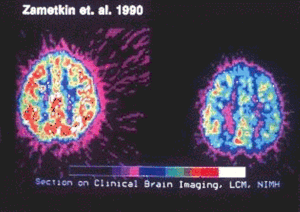Adult attention-deficit disorder
| Attention deficit hyperactivity disorder | |
|---|---|
 |
|
| Left: brain activity in healthy subjects. Right: apparent decreased brain activity in people living with ADHD. (Zametkin et al, 1990) | |
| Classification and external resources | |
| Specialty | psychiatry |
| ICD-10 | F90 |
| ICD-9-CM | 314.00, 314.01 |
| OMIM | 143465 |
| DiseasesDB | 6158 |
| MedlinePlus | 001551 |
| eMedicine | med/3103 ped/177 |
| MeSH | D001289 |
Adult attention deficit hyperactivity disorder (also referred to as adult ADHD, adult with ADHD, or simply ADHD in adults, formerly AADD) is the neurobiological condition of attention deficit hyperactivity disorder (ADHD) in adults.
About one-third to two-thirds of children with symptoms from early childhood continue to demonstrate notable ADHD symptoms throughout life.
Three presentations of ADHD are identified in the DSM-5 as:
In later life, the hyperactive/impulsive subtype manifests less frequently. The hyperactivity symptoms tend to turn more into "inner restlessness", starting in adolescence and carrying on in adulthood.
Adult ADHD is typically marked by inattentiveness, difficulty getting work done, procrastination and organizational problems. Specifically, adults with ADHD present with persistent difficulties in following directions, remembering information, concentrating, organizing tasks, completing work within specified time frames and appearing timely in appointments. These difficulties affect several different areas of an ADHD adult's life, causing emotional, social, vocational, marital, legal, financial and/or academic problems. As a result, low self-esteem is commonly developed. However, given the right guidance and coaching, these traits of ADHD could also lead to career success.
Diagnosis of the condition follows after one or several assessment interviews by a clinician including:
as well as evaluation to diagnose additional possible conditions which often coexist with ADHD, called comorbidities or comorbid disorders.
The condition is highly heritable, and while its exact causes are not fully known, genetic or environmental factors are understood to play a part. ADHD is a childhood-onset condition, usually requiring symptoms to have been present before age 12 for a diagnosis. Children under treatment will migrate to adult health services if necessary as they transit into adulthood, however diagnosis of adults involves full examination of their history.
...
Wikipedia
